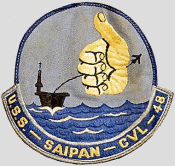Click On Image
For Full Size Image |
Size |
Image Description |
Contributed
By And/Or Copyright |
Name
|

NS024845 |
14k |
CVL-48 was named after an island in the Marianas (NS024845),
the site of the initial Allied landings in that group on 15 June 1944. After bitter fighting ashore
and at sea, the island was secured in mid-July and developed into an Allied air base.
NS0403529: Invasion of Saipan, June 1944. LVTs move toward the beach, past
bombarding cruisers, on "D-Day", 15 June 1944. Cruiser firing in the background is USS Indianapolis
(CA-35), flagship of Fifth Fleet commander Admiral Raymond A. Spruance. Photographed from USS Birmingham
(CL-62). Courtesy of the National Archives and Records Administration,
photo # 80-G-231838, via Scott Dyben.
(Map NS024845 courtesy of Google Maps.) |
NavSource |

NS0403529 |
113k |
1945–1963
|
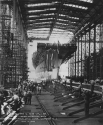
NS024857 |
263k |
Saipan was launched on Sunday, 8 July 1945, and sponsored by
Mrs. John W. McCormack (née Marguerite Harriet Joyce), wife of Representative John W. McCormack
(D-MA), House Majority Leader at the time. New York Shipbuilding Corp., Camden, NJ.
National Archives and Records Administration,
NARA II, College Park, MD. |
Tracy White, Researcher @ Large |

NS024842 |
339k |
"Inclining Experiments."
Photo and text from Saipanorama, the newsletter of the USS Saipan CVL48 Assn., issue #98,
August 2015. |
Courtesy of Tom Pendergast, Secretary-Treasurer, and the USS Saipan CVL-48 Association. |

NS024826 |
195k |
[Sunday, ]14 July 1946. USS Saipan (CVL-48) is placed in commission
at the Philadelphia Navy Yard. Captain John Crommelin, USN Commanding. Note the fourth stack directly
behind the island. It was removed in 1948 to reduce topside weight and help the rolls. It didn't.
Photo and text from Saipanorama, the newsletter of the USS Saipan CVL48 Assn., issue #92,
February 2014. |
Courtesy of Tom Pendergast, Secretary-Treasurer, and the USS Saipan CVL-48 Association. |

NS024855 |
736k |
"Saipan had no shakedown cruise—Over the years, many have
scoffed at the story that Saipan never had a shakedown cruise. It is a fact and I have
just uncovered this document from some photos Tom O'Connor gave to me."
Photo and text from Saipanorama, the newsletter of the USS Saipan CVL48 Assn., issue #108,
February 2018. |
Courtesy of Tom Pendergast, Secretary-Treasurer, and the USS Saipan CVL-48 Association. |

NS024801 |
57k |
USS Saipan (CVL-48) as completed, November 2, 1946. |
USN |

NS024840 |
34k |
Undated photo showing the back end of the island of USS Saipan
(CVL-48). Note the flag bag and the ship's bell. |
Courtesy of Tom Pendergast, Secretary-Treasurer, and the USS Saipan CVL-48 Association. |

NS024863 |
205k |
A nosed-over North American SNJ Texan after hitting the barrier aboard
USS Saipan (CVL-48). Following her commissioning on 14 July 1946, Saipan
trained student pilots out of Naval Air Station Pensacola, Florida, from September 1946 to April 1947.
U.S. Navy photo from the Saipan 1946–1947
Cruise Book. |
Robert Hurst. |

NS024846 |
108k |
Series of five photos showing the island and masts of USS Saipan
(CVL-48). Location and date unknown.
Photos now in the collections of the National Archives and Records
Administration (NARA).
NS024846: NARA local identifier rg19nn-b1585-002-011.
NS024846a: NARA local identifier rg19nn-b1585-002-012.
NS024846b: NARA local identifier rg19nn-b1585-002-013.
NS024846c: NARA local identifier rg19nn-b1585-002-014.
NS024846d: NARA local identifier rg19nn-b1585-002-015.
|
NARA. |

NS024846a |
140k |
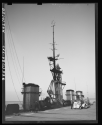
NS024846b |
119k |
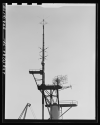
NS024846c |
84k |

NS024846d |
131k |

NS024867 |
312k |
View of the starboard 40mm Bofors Mk.1 mounts of USS Saipan
(CVL-48) firing during a gunnery drill, in 1947. A Grumman TBM-3 Avenger of Attack Squadron
(VA) 1L is visible on the flight deck. It wears the Light Carrier Air Group (CVLG) 1 tail code, "SA".
(Inset in NS024850c.)
U.S. Navy photo from the Saipan
1946–1947 Cruise Book. |
Robert Hurst |

NS024867a |
197k |
View of a 40mm Bofors Mk.2 mount on the bow of USS Saipan (CVL-48)
firing during a gunnery drill, circa 1946–1947.
U.S. Navy photo from the Saipan
1946–1947 Cruise Book. |

NS024867b |
210k |
U.S. Navy North American
SNJ Texan training aircraft from Naval Air Station Pensacola, Florida, aboard the small (light)
aircraft carrier USS Saipan (CVL-48), sometime between September 1946 and April 1947.
Following her commissioning on 14 July 1946, Saipan trained student pilots out of Pensacola
from September 1946 to April 1947.
U.S. Navy photo from the Saipan 1946–1947 Cruise Book. |

NS024843 |
72k |
"Most people believe that carriers had plenty of space. There is, but not
for the men. For the airplanes. How many of you remember going from one end of the hangar deck to
the other end. Ducking under wings and bumping your head on planes. The worst thing was catching
your shins on the aircraft tie down wires and falling down. Really hurt didn't it? Just getting to
the chow line which formed on the hangar deck was a challenge on most days while at sea."
Photo and text from Saipanorama, the newsletter of the USS Saipan CVL48 Assn., issue #97,
May 2015. |
Courtesy of Tom Pendergast, Secretary-Treasurer, and the USS Saipan CVL-48 Association. |

NS024804 |
151k |
USS Saipan (CVL-48) underway at sea, with eight FH-1 Phantom
jet fighters on her flight deck. The original print is dated June 1953, but the presence of FH-1s
and the general rig of the ship indicate that the photograph was actually taken during the late 1940s.
Official U.S. Navy Photograph, from the collections of the Naval Historical Center (# NH 97612). |
NHC |

NS024813 |
173k |
USS Saipan (CVL-48), probably in the late 1940s. Note the mix
of aircraft on her deck: early jet and a variety of prop types.
Bill Fessenden (Newmarket, NH) comments: "The photo was taken at Portsmouth Naval Shipyard, Kittery,
Maine (PNSY), during the ship's April (?) 1948 visit (DANFS). In the upper right background can be
seen the US Route 1B bridge between New Castle, NH (on the left) and Portsmouth, NH. The large building
on the horizon, to the left of the ship's island, is the locally famous Wentworth Hotel, on New Castle
Island. The restored, late 19th century grand hotel, still stands, to this day. It should also be
noted that PNSY was/is used primarily for submarine work, as evidenced by the submarine moored forward
of the CVL, and the submarine components on the dock in the photo's foreground." |
David Buell |

NS024862 |
90k |
A McDonnell FH-1 Phantom fighter of U.S.
Navy Fighter Squadron (VF) 17A "Phantom Fighters" is about to be catapulted from USS Saipan
(CVL-48), 6 May 1948. Note the deck crewman enjoying the pleasures of the new jet age by warming himself
with the exhaust from the Phantom's engines (arrow by Naval Aviation News).
Naval
Aviation News, July
1948 issue. |
Robert Hurst |

NS024862a |
158k |
A McDonnell FH-1 Phantom fighter of U.S.
Navy Fighter Squadron (VF) 17A "Phantom Fighters" taking off from USS Saipan (CVL-48),
6 May 1948. One of the carrier's 40 mm quadruple bow-mounted AA mounts can be seen in the lower part of the picture.
Naval
Aviation News, July
1948 issue. National Naval Aviation Museum
photo, # 1996.253.7239.xxx. |

NS024862b |
134k |
A U.S. Navy McDonnell FH-1
Phantom of Fighter Squadron (VF) 17A aboard the USS Saipan (CVL-48), with its
wings folded, May 1948.
National Naval Aviation Museum
photo, # 1996.253.7238.019. |

NS024862c |
111k |
A U.S. Navy McDonnell FH-1
Phantom of Fighter Squadron (VF) 17A aboard USS Saipan (CVL-48), May 1948.
National Naval Aviation Museum
photo, # 1996.253.7238.015. |

NS024862d |
119k |
A U.S. Navy McDonnell FH-1
Phantom of Fighter Squadron (VF) 17A recovering aboard USS Saipan (CVL-48), May
1948.
National Naval Aviation Museum
photo, # 1996.253.7238.016. |

NS024862f |
952k |
U.S. Navy McDonnell FH-1
Phantoms of Fighting Squadron (VF) 17A aboard
USS Saipan (CVL-48), May 1948.
VF-17A was redesignated Fighter Squadron (VF) 171 on 11 August 1948.
National Naval Aviation Museum
photo, # 1996.253.7239.018. |

NS024862g |
1.12M |
U.S. Navy McDdonnell FH-1
Phantoms of Fighting Squadron (VF) 17A aboard USS Saipan (CVL-48), 6 May 1948.
VF-17A was redesignated Fighter Squadron (VF) 171 on 11 August 1948.
National Naval Aviation Museum
photo, # 1996.253.7238.010. |

NS024862e |
1.20M |
U.S. Navy McDonnell FH-1
Phantoms of Fighter Squadron (VF) 17A operating off USS Saipan (CVL-48), in 1948.
During the exercises the planes made strafing runs on a floating target. This was the first time that
their guns had been fired from the air.
National Naval Aviation Museum
photo, # No. 1996.253.7238.006. |
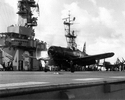
NS024841 |
325k |
An F4U-4 Corsair from VF-1L taking off from USS Saipan
(CVL-48) circa 1947, during operations in the Atlantic Ocean.
National Naval Aviation Museum photo (# 1996.253.7141.007). |
Mike Green |

NS024851 |
185k |
The U.S. Navy heavy cruiser USS Oregon
City (CA-122) tows the light aircraft carrier USS Saipan (CVL-48) during a towing
exercise in the Caribbean Sea, April 1947. U.S. Navy photo from the Saipan 1946–1947
Cruise Book. |
Robert Hurst |
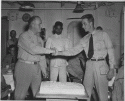
NS024814 |
117k |
LT(JG) C.B. Griffin, USNR, made the 20,000th landing aboard USS
Saipan (CVL-48). |
David Buell |
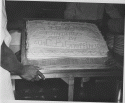
NS024814a |
110k |

NS024822 |
121k |
Undated picture of the light aircraft carrier USS Saipan (CVL-48)
underway, location unknown. Note the wartime aircraft types parked on her flight deck. U.S. Navy
photo.
Photo and text from Aircraft
Carriers, by Norman Polmar. |
Robert Hurst |

NS024839 |
272k |
USS Saipan, US Naval Air Station Pensacola, Florida. US Navy
official photograph. This photo, a post card, "had to be [taken] before 1948 because the four original
stacks are clearly visible. The stack immediately after the island was removed in 1948. It was done
for two reasons. To reduce topside weight and to eliminate stack gas from going onto the bridge and
Air Control spaces." |
Courtesy of Tom Pendergast, Secretary-Treasurer, and the USS Saipan CVL-48 Association,
via Ron Reeves |
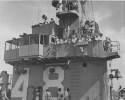
NS024815 |
142k |
Civilians watch operations from USS Saipan's island. From the
7th to the 24th of February 1948, Saipan transported the United States delegation to
the Venezuelan President Rómulo Gallegos inauguration and back. This photo may have been taken
during this diplomatic mission. |
David Buell |

NS024816 |
181k |
USS Saipan (CVL-48) underway, early in her career (1946–1948),
with Light Carrier Air Group 1 (CVLG-1) aboard. CVLG-1 deployed with the ship for her diplomatic mission
to Venezuela in February 1948 (see NS024815). |
David Buell |

NS024817
 |
13.3M |
The Venezuelan Presidential Inauguration Cruise of the U.S.S. Saipan
CVL-48. February 7–24, 1948. |
Tom Pendergast,
Secretary-Treauser,
USS Saipan CVL-48 Association |

NS024818 |
98k |
A McDonnell FH-1 Phantom fighter of Fighter Squadron VF-17A "Phantom
Fighters" taxis to the catapult during carrier qualifications on the light aircraft carrier USS Saipan
(CVL-48), in May 1948. USN photo scanned from The
History of US Naval Air Power (Robert L. Lawson (ed.); The Military Press, New York (USA),
1985. ISBN 0-517-414813, p. 122.) |
Robert Hurst |

NS024823 |
113k |
USS Saipan (CVL-48) on 6 May 1948. Note the general similarity
to the Independence class ships; the principal differences are the two 40mm AA gun tubs on the
forecastle and the absence of a hull bulge. By this time one smokestack had been removed to improve
stability. Photo USN (G Albrecht Collection).
Photo and text from Aircraft
Carriers of the U.S. Navy, by Stefan Terzibaschitsch. |
Robert Hurst |

NS024820 |
83k |
U.S. Marine Corps Piasecki HRP-1 Rescuers are preparing to fly out to
the light aircraft carrier Saipan (CVL-48) for shipboard duties [late December 1948?].
U.S. Marine Corps photo.
From Aircraft
Carriers, by Norman Polmar. |
Robert Hurst |
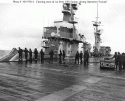
NS024805 |
93k |
Crewmen wash snow and ice from the flight deck and superstructure, during Operation
Icecap. Ice is visible on the island and mast. Date may be circa late December 1948, when
Saipan was sent to Greenland waters on a rescue mission.
Official U.S. Navy Photograph, from the collections of the Naval Historical Center (# NH 97614). |
NHC |

NS024856 |
135k |
One of five twin-rotored Piasecki helicopters to be used in an attempted rescue
of airmen stranded on the Greenland icecap touches down on the deck of the USS Saipan
(CVL-48) on 27 December 1948 at the Philadelphia Navy Yard. The carrier battled 100-mile-per-hour winds
the previous day and would be delayed in reaching the rescue launching position. The helicopters, built
at Morton, Pennsylvania, were securely lashed to the carrier's flight deck.
Source: Philadelphia
Evening Bulletin, George D. McDowell Collection. |
Mike Green |

NS024864 |
74k |
A U.S. Marine Corps
Piasecki HRP-1 Rescuer (colloquially known as the "flying banana") landing on the light aircraft
carrier USS Saipan (CVL-48) in 1948.
U.S. Navy photo USN 7006643 from USN publication
United States Naval Aviation 1910-1995, Appendix 3: Aviation Ships. |
Robert Hurst |

NS024829 |
132k |
A series of photos of an F4U Corsair from VMF-211 that went into the
water after a deck launch some time in the late 1940s.
Saipanorama #92, February 2014, page 9. |
Courtesy of Tom Pendergast, Secretary-Treasurer, and the USS Saipan CVL-48 Association. |

NS04020307 |
2.43M |
"This 1949 photo taken from the endpapers of New York Shipbuilding's 50th
anniversary book, shows Newton Creek at high tide. The view is to the southeast, toward Gloucester
Heights. Yorkship Village (Fairview) is at the upper left, flanked by the North Branch and the wide
tidal floodplain of the creek's main channel. A causeway bridge across the main channel links Yorkship
Village's Collings Road with Gloucester at the upper right. A rail line (note the freight train) follows
the west bank of the creek. Conspicuously missing from this image are the east end of the Walt Whitman
Bridge, I-676, and the bridge interchange, all built in the late 1950s. Most of the tidal floodplain
seen here was filled and the course of the North Branch was altered during construction. The mouth
of Newton Creek is at the center right. A heavy cruiser or battleship is moored in the creek. Another
capital ship occupies one of the open slipways. Portions of two light carriers can be seen in the wet
slip at the lower left, adjacent to the covered slipways."
"In the lower left of center of the photo are two CVL's afloat and fitting-out. I believe this to
be the sisters USS Saipan (CVL-48) and USS Wright (CVL-49),
the last two CVL's to be built. This being the case, the photo would have to have [been] taken in the
time period between 1 Sep 45 (launch of CVL-49) and 14 Jul 46 (commissioning of CVL-48)."
"The large vessel fitting out to the right of the carriers, afloat and under cover, appears to be
an Alaska Class Large Cruiser. USS Hawaii
(CB-3) was launched on 3 Nov 45, and construction photos show the fitting out of the vessel under cover."
"The[re] is also what appears to be a Baltimore class heavy cruiser at the far right of the
photo, in near-complete condition. USS Toledo
(CA-133) was launched in May 1945, and commissioned 27 Oct 1946. In the early spring of 1946, this
vessel may have been this far along in its fitting-out, to have reached the ship's condition of the
photo, but that is only speculation, on my part."
This is the fitting piers, covered ways, and Newton Creek shipways at New York Ship between 1945
and October 1946. At the open ways, Newark
(CL-108) has been cleared, and New Haven and Buffalo
(CL-110) remain un-worked. Toledo is in Newton Creek. Saipan and Wright
are fitting out at left. |
Bill Fessenden
John Chiquoine |

NS024860 |
126k |
Accident report, 16 February 1950: "Marine Corps pilot 1st Lt.
Loren Grover of Marine Fighter Squadron (VMF) 212 launched from Saipan in F4U-4 (BuNo
81473) assigned to VMF-211. As the plane gained speed, the left wing rose toward the folded position.
Upon reaching the end of the flight deck, the left wing was at about a 45-degree angle. As soon as
the plane became airborne, the wing was torn off. The Corsair rolled to the left, hit the water
off the port bow in a 35-degree, nose-down attitude on its back, and sank. An extensive search was
conducted, but the pilot was never recovered. The accident board determined there was a failure to
check the left wing for positive lock before final turn-up and launch."
From Naval
Aviation News, November–December
1997 issue. |
Bob Canchola, BT, USN (Ret.) |

NS024860a |
127k |

NS024860b |
73k |
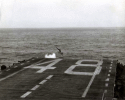
NS024860c |
87k |
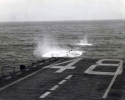
NS024860d |
133k |

NS024837 |
212k |
USS Saipan (CVL-48) entering port with a full deck of planes,
probably in the early 1950s.
From Saipanorama, the newsletter of the USS Saipan CVL48 Assn., issue #99, November 2015. |
Courtesy of Tom Pendergast, Secretary-Treasurer, and the USS Saipan CVL-48 Association
Larger
copy submitted by Richard Miller, BMCS, USNR (Ret.). |

NS024834 |
79k |
This photo is labeled as "3rd and 4th Divisions 23 June 1950." This apparently
was before the large drafts of men started coming aboard at the beginning of the Korean War. Tom Pendergast
came aboard in November 1950 and there were two Deck Division at that time. The First and Second Divisions.
The Third and Fourth Divisions were apparently merged into the First and Second Division. Does anyone
remember why and when this was done?
From Saipanorama, the newsletter of the USS Saipan CVL48 Assn., issue
#94, August 2014. |
Courtesy of Tom Pendergast, Secretary-Treasurer, and the USS Saipan CVL-48 Association. |

NS024830 |
85k |
A TBM Avenger from VS-31 that hit the last stack, broke up and went
over the side sometime in 1950.
Saipanorama #92, February 2014, page 9. |
Courtesy of Tom Pendergast, Secretary-Treasurer, and the USS Saipan CVL-48 Association. |

NS024870 |
256k |
The U.S. Navy small aircraft
carrier USS Saipan (CVL-48) at anchor off Kingston, Jamaica, in early 1951.
U.S. Navy photo from the Saipan 1951 Cruise Book. |
Robert Hurst |

NS024838 |
98k |
USS Saipan (CVL-48), 27 March 1951. There are several different
Squadrons and Detachments represented on the flight deck: VF-42 (?) (tail code "C"), VC-4 ("NA"), VC-12
("NE"), and VC-33 ("SS").
Photo by Marius Bar, Toulon, France. |
Jaume Cifré Sánchez |

NS024824 |
76k |
USS Saipan (CVL-48) at anchor on 26 April 1951, in an unknown
Mediterranean port. There are two unidentified antennas on the radar mast, as well as SPS-6 and SP.
The wide bow allowed two 40mm AA mounts to be fitted side by side. Of note Saipan was
not placed in reserve after World War Two and continued in service without interruption until 1957.
Photo Marius Bar.
Photo and text from Aircraft
Carriers of the U.S. Navy, by Stefan Terzibaschitsch. |
Robert Hurst |
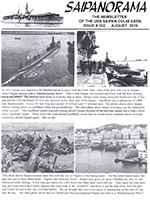
NS0842413 |
1.30M |
"In 1951 Saipan was ordered to the Mediterranean to serve with
the Sixth Fleet. One of the port calls[, 5–9 May,] was in Algiers where Saipan
tied up with a 'Mediterranean Moor'. That is that Saipan was moored stern first with
the bow sticking out in the harbor. The anchors were down to hold the ship in place. Barges were
strung along the Starboard side of Saipan and the USS Quillback
SS 424 was moored on the other side of the barges."
From Saipanorama, the Newsletter of the USS Saipan CVL48 Assn., issue #102, August
2016. |
Courtesy of Tom Pendergast, Secretary-Treasurer, and the USS Saipan CVL-48 Association,
via Ron Reeves. |

NS024861 |
117k |
E-R Division on the Med Cruise 1951.
Front Row L to R: McElwaine, Van Dine, Nadeau, Treat ETC, LT(JG) Shonk, CRELE Pierce, Brown, Unsworth,
Hockensmith.
Back Row L to R: Tourand, Thompson, Gonglewski, Reed, Kelly, McMasters, Allen, Stark, Goforth, Worley,
Zibuda, Seeley.
Photo and text from Saipanorama, the newsletter of the USS Saipan CVL48 Assn., issue #108,
February 2018. |
Courtesy of Tom Pendergast, Secretary-Treasurer, and the USS Saipan CVL-48 Association. |

NS024850 |
177k |
USS Saipan (CVL-48), M Division, Med Cruise 1951.
From Saipanorama, the newsletter of the USS Saipan CVL48 Assn., issue #102, August 2016. |
Courtesy of Tom Pendergast, Secretary-Treasurer, and the USS Saipan CVL-48 Association |

NS024850a |
184k |
USS Saipan (CVL-48), S-1 Division, Med Cruise 1951.
From Saipanorama, the newsletter of the USS Saipan CVL48 Assn., issue #103, November 2016. |

NS024850b |
234k |
USS Saipan (CVL-48), 1st Division, Med Cruise 1951.
From Saipanorama, the newsletter of the USS Saipan CVL48 Assn., issue #105, May 2017. |
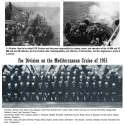
NS024850c |
234k |
USS Saipan (CVL-48), Fox Division, Med Cruise 1951.
(See also NS024867.)
From Saipanorama, the newsletter of the USS Saipan CVL48 Assn., issue #112, February 2019. |

NS024811 |
27k |
USS Saipan (CVL-48) at anchor circa 1952, location unknown. |
Robert Hurst |

NS024865 |
237k |
"ARCTIC CIRCLE 1952–The five weeks Saipan spent in the
Arctic Circle in 1952 was perhaps the 'toughest' cruise of Saipan's career. These photos
of the 40mm guns frozen were sent to us by Vera Jean Madison, wife of our departed shipmate Curtis
Madison GM3. The guns were unable to be fired because of the ice. And also that no one was on the forecastle
because of the heavy seas that came over constantly. Arresting Gear men had to constantly exercise
the barriers and wires to keep them from freezing up also. Carl Newberry of V-2 Division says that
there was not enough foul weather gear to help keep warm. V-1 and V-2 sleeping compartments were the
only two berthing compartments that opened to the outside. Any time they changed the watch or brought
garbage up to go over the side the watertight doors had to be opened ans it was so cold outside it
simply sucked what little heated air we had out."
Photo from Saipanorama, the newsletter of the USS Saipan CVL48 Assn., issue #112, February
2019. |
Courtesy of Tom Pendergast, Secretary-Treasurer, and the USS Saipan CVL-48 Association. |
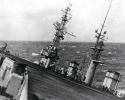
NS024844 |
667k |
USS Saipan (CVL-48) rolls to starboard in heavy Atlantic Ocean
seas, circa 1952.
National Naval Aviation Museum, Photo No. 1996.488.035.008. |
Mike Green |

NS024852 |
190k |
Anti-submarine patrols in the Caribbean. Saipan passes Morro
Castle while departing San Juan, Puerto Rico after a weekend liberty while on ASW patrols. Circa March
1952.
Photo from Saipanorama, the newsletter of the USS Saipan CVL48 Assn., issue #105, May 2017. |
Courtesy of Tom Pendergast, Secretary-Treasurer, and the USS Saipan CVL-48 Association. |

NS024848 |
371k |
"Jets on Saipan April 13, 1952"
Photos and text from Saipanorama, the newsletter of the USS Saipan CVL48 Assn., issue #98,
August 2015. |
Courtesy of Tom Pendergast, Secretary-Treasurer, and the USS Saipan CVL-48 Association. |

NS024819 |
161k |
In the summer of 1952, 26 Atlantic Fleet ships, including USS
Saipan (CVL-48) took 3,600 Naval Academy and Naval Reserve "Middies" (midshipmen) on
their training courses, to eight ports in Western Europe and then to Guantanamo Bay, Cuba.
Saipan visited Torquay, England, and Dublin, Ireland.
Newspaper clip and two views of an UNREP with USS Salamonie
(AO-26). |
Tom Pendergast,
Secretary-Treauser,
USS Saipan CVL-48 Association |

NS024819a |
109k |

NS024819b |
311k |

NS024812 |
45k |
USS Saipan (CVL-48) underway circa 1953, location unknown (USN
photo.) |
Robert Hurst |

NS024833 |
3.20M |
USS Saipan CVL-48, VMA-324, HU-1, Far East and Around the World,
1953–1954. |
Tom Pendergast, Secretary-Treauser, USS Saipan CVL-48 Association,
via Ron Reeves |

NS024853 |
331k |
"40mm gun crews in the Yellow Sea in Korea." "Elevator Crews During the
World Cruise." From Saipanorama, the newsletter of the USS Saipan CVL48 Assn., issue #106,
August 2017. |
Courtesy of Tom Pendergast, Secretary-Treasurer, and the USS Saipan CVL-48 Association. |

NS024859 |
214k |
"Marine Corps Heavy Attack Squadron VMA-324, Circumnavigated the globe aboard
USS Saipan (CVL-48), Served in Korea and French Indo-China 1953–54"
"AD Skyraider aircraft of VMA-324 on deck of USS Saipan (CVL-48) in the Yellow
Sea. Planes were lined up three across. This photo shows how dangerous it was for Plane Captains and
Flight Deck Crews. The watch words were 'Never stand up in the sleapstream of a propeller' ' The alternative
to staying alert on the Flight Deck is that you could have a very bad day' and 'The penalty for failure
on the Flight Deck is death. Maybe not your death, but someone usually dies if you fail to stay alert
and do your job right'"
Photo and text from Saipanorama, the newsletter of the USS Saipan CVL48 Assn., issue #108,
February 2018. |
Tom Pendergast, Secretary-Treauser, and the USS Saipan CVL-48 Association |

NS024827 |
422k |
Marine Attack Squadron (VMA) 324 "Vagabonds" celebrating the Marine Corps
birthday on the hangar deck of USS Saipan (CVL-48) while in the Far East, November 1953. |
Tom Pendergast, Secretary-Treauser, USS Saipan CVL-48 Association,
via Ron Reeves |

NS024866 |
62k |
USS Saipan (CVL-48) anchored at the British Crown Colony of
Hong Kong in February 1954. Douglas AD Skyraiders of Marine Attack Squadron (VMA) 324 "Vagabonds"
are parked on the bow.
Official U.S. Navy photo, National
Archives and Records Administration photo No. 80-G-634756. Naval
Aviation News, May
1954 issue, p. 2. |
Robert Hurst |

NS024806 |
93k |
Lieutenant Colonel Julius W. Ireland, USMC, Commanding Officer of Marine Attack
Squadron 324 (VMA-324) is greeted by a French Navy officer, after his squadron delivered AU-1 Corsair
aircraft to the French at Tourane (Danang) airfield, Indo-China, on 18 April 1954. One of the AU-1s
is behind them. The planes were transported to the area by USS Saipan (CVL-48).
U.S. Naval Historical Center Photograph (# NH 84042).
Note: COL Julius Wirth Ireland, USMC (Ret.), 93, died in Honolulu, HI, 28 July 2010. |
NHC |

NS024807 |
115k |
French Naval Aviator C.A. Libiot (left center) greets Second Lieutenant John
F. Schrepferman, USMCR, of Marine Attack Squadron 324 (VMA-324) as VMA-324 pilots delivered AU-1 Corsair
aircraft to the French at Tourane (Danang) airfield, Indo-China, on 18 April 1954. Libiot and other
French aviators had trained at Naval Air Station, Pensacola, with some of VMA-324's pilots. Three
of the AU-1s are behind them. The planes were transported to the area by USS Saipan
(CVL-48).
U.S. Naval Historical Center Photograph (# NH 84051). |
NHC |
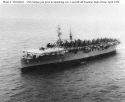
NS024808 |
57k |
USS Saipan (CVL-48) off Tourane (Danang), Indo-China, on 18 April
1954, just prior to launching twenty-five AU-1 Corsair aircraft, which were flown ashore for
delivery to the French.
U.S. Naval Historical Center Photograph (# NH 84043). |
NHC |

NS024828 |
76k |
"SXP897-5-21-NAGASAKI, JAPAN.: Crewmembers of the USS Saipan
line up on the carrier's flight deck to spell out in Japanese characters, Minasan Konichiwa (hello
everyone), as their ship enters the port here for open house on Armed Forces Day. U.S. NAVY PHOTO
FROM UNITED PRESS TELEPHOTO" (21 May 1954). The photo was taken on 14 May (thanks to Tom Pendergast,
Secretary-Treauser, USS Saipan CVL-48 Association.) |
Tom Pendergast
& Ron Reeves
Tommy Trampp |
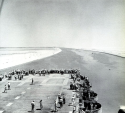
NS024869 |
497k |
USS Saipan (CVL-48) transiting the Suez Canal on 20 June 1954.
The aircraft carrier, with Marine Attack Squadron (VMA) 324 "Vagabonds," made a round-the-world cruise
from 28 September 1953 to 21 July 1954 (VMA-324 embarked on 30 September 1953 and disembarked on 19
July 1954). |
Robert Hurst |

NS024809 |
92k |
USS Saipan (CVL-48) with HRS and HUP helicopters on her flight
deck, circa the mid-1950s.
Courtesy of Donald M. McPherson, 1969.
U.S. Naval Historical Center Photograph (# NH 67747). |
NHC |
|
|
Photos by
LT(JG) George V. Vuscavage, 1952–1955,
submitted by his daughter MR2
Janna Ryals, 1985–1992,
via Bob Canchola, BT, USN (Ret.) |

NS024858 |
676k |
"At the end of September [1955, USS Saipan (CVL-48)]
was ordered to Mexico to again assist in hurricane relief work. From 1 to 9 October, her helicopters
evacuated survivors, flew in rescue personnel, and distributed food, water, and medical supplies, primarily
in the flooded Tampico area. On 12 October, she returned to Pensacola, where she remained until April
1957." (Quoted from DANFS.)
NS024858: Flood victims at Panuco, Mexico, wade through flood waters in the
downtown streets. National Archives and Records Administration
(NARA), photo # 330-PS-7528 (USN 651156).
NS024858a: A U.S. Navy HUP-2 Retriever helicopter, BuNo 128499, attached
to Helicopter Training Unit (HTU) 1, and operating from Saipan, lowers its hoist to rescue
a Mexican family from an isolated house near Tampico, Mexico. National
Archives and Records Administration (NARA), photo # 330-PS-7528 (USN 681154).
NS024858b: A U.S. Navy HUP-2 Retriever helicopter, attached to HTU-1
and operating from Saipan, brings Mexican woman and children to high ground at Tampico,
Mexico. Navy helicopters carried food, medicine, and doctors to the areas in Mexico stricken by Hurricane
Janet and evacuated isolated people to high ground. National
Archives and Records Administration (NARA), photo # 330-PS-7528 (USN 681155).
NS024858c: A Mexican woman and her three children are stranded by flood waters
from Hurricane Janet on top of a church at Tampico, Mexico. This photograph was taken by a U.
S. Navy helicopter from Saipan. National
Archives and Records Administration (NARA), photo # 330-PS-7528 (USN 681157). |
NARA |

NS024858a |
705k |

NS024858b |
630k |
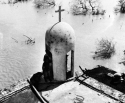
NS024858c |
527k |
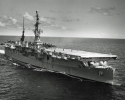
NS024847 |
436k |
Starboard bow view of USS Saipan (CVL-48) underway, circa 1956.
National Naval Aviation Museum, Eisenbarth Photograph
Collection, photo # 2008.122.099. |
Mike Green
Pieter Bakels |
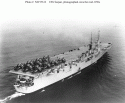
NS024810 |
78k |
USS Saipan (CVL-48) underway circa the mid-1950s, with eleven
AD Skyraider attack planes (from Marine Attack Squadron (VMA) 324 "Vagabonds") parked on her
flight deck, aft. Note submarine approaching, in the right distance.
Official U.S. Navy Photograph, from the collections of the Naval Historical Center (# NH 97613). |
NHC |

NS024868 |
141k |
U.S. Navy cadets touring
USS Saipan (CVL-48), docked in Pensacola, Florida, 1956.
Photo courtesy of father of JGKlein. |
Robert Hurst |

NS024825 |
111k |
The light carrier Saipan (CVL-48), October 1956, at the end
of her active carrier career. She was armed with three quadruple and ten twin 40-mm guns, controlled
by six Mark 57 radar fire control systems (with Mark 28 radar) and eight Mark 51 mod 2s. Other major
electronic equipment included an SPS-4 (surface/zenith search), SPS-6B, SPS-8, SR (after radar mast),
SPN-2, SPN-12, TACAN (URN-3), YG (beacon), and HF/DF (after radar mast).
Drawing and text from U.S.
Aircraft Carriers: An Illustrated Design History, by Norman Friedman. |
Robert Hurst |

NS024849 |
142k |
USS Saipan's commanding officer, CAPT William R. Kane, was
killed in a plane crash on 5 February 1957, and was succeeded by CAPT Geoffrey P. Norman. The ship's
XO, CDR Noel R. Bacon, was also injured. |
Ron Reeves |

NS024802 |
76k |
Artwork reproduction of an insignia received during the 1950s.
U.S. Naval Historical Center Photograph (# NH 70134-KN).
|
NHC |
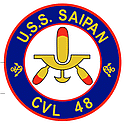
NS024802a |
117k |
Two more artwork reproductions of Saipan's insignias. |
Wolfgang Hechler |
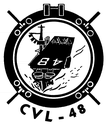
NS024802b |
115k |
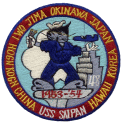
NS024802c |
386k |
USS Saipan (CVL-48), WestPac (and Around the World) cruise,
28 September 1953–21 July 1954. |
Tommy Trampp |

NS024821 |
518k |
From Saipanorama, the newsletter of the USS Saipan CVL48 Assn., issue
#74, October 2009:
- Sea story: while under tow from Bayonne to Philadelphia, decommissioned Saipan almost
rammed the tug.
- Obituary for Admiral Ralph W. Cousins, who, as a Commander, served aboard Saipan
in 1950–52.
|
USS Saipan Association,
via Ron Reeves |

NS024831 |
190k |
From Saipanorama, the newsletter of the USS Saipan CVL48 Assn., issue
#92, February 2014:
- Black Ship Festival, fall 1954.
|
USS Saipan Association,
via Ron Reeves |

NS024831a |
228k |
From Saipanorama, the newsletter of the USS Saipan CVL48 Assn., issue
#92, February 2014:
- Commander Hal Buell Honored.
|

NS024832 |
18k |
"You all remember the two 50 man motor launches that Saipan
had. It was the only way off the ship when we anchored out, which was most of the time. At liberty
call everyone would line up by rate to be inspected by the OOD. Loading boats went by rank no matter
how long you were in line. First Class, Second Class, Third Class, and then the non rated men. Chiefs
went to the head of the line at any time. No matter how long you were in line if a higher rated man
came up he went ahead of you. Remember the saying, 'Rank has it's privileges', it really was true.
Remember having 500 men ready to go ashore with two boats and a half hour run to the fleet landing
and back. When in Norfolk, the base used to lend us another motor launch. Remember the 'covered wagons?'
Simply a motor launch with a canvas top. The OOD sent the boats off with the order 'Shove off cox'n,
your boat's loaded. Make for the fleet landing and return immediately."
From Saipanorama, the newsletter of the USS Saipan CVL48 Assn., issue
#93, May 2014. |
USS Saipan Association,
via Ron Reeves |

NS024835 |
45k |
"First Division men are marrying up the mooring lines and putting the rat
guards on. What is the man on the anchor doing? Judging from this photo, Saipan is
moored port side to. This was unusual because the Quarterdeck was on the starboard side and Saipan
would always tie up starboard side to if possible."
From Saipanorama, the newsletter of the USS Saipan CVL48 Assn., issue
#96, February 2015. |
Courtesy of Tom Pendergast, Secretary-Treasurer, and the USS Saipan CVL-48 Association |
For more photos and information about this ship, see:
|
